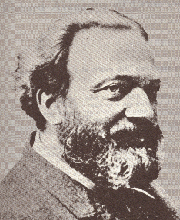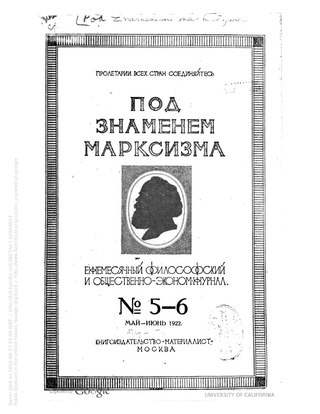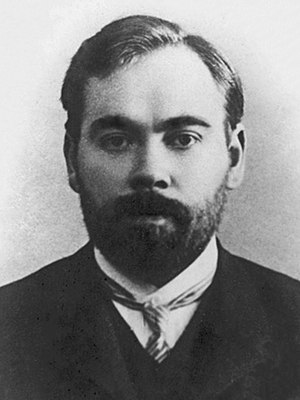Systems theory is the transdisciplinary study of systems, i.e. cohesive groups of interrelated, interdependent components that can be natural or artificial. Every system has causal boundaries, is influenced by its context, defined by its structure, function and role, and expressed through its relations with other systems. A system is "more than the sum of its parts" by expressing synergy or emergent behavior.

Ernst Waldfried Josef Wenzel Mach was an Austrian physicist and philosopher, who contributed to the physics of shock waves. The ratio of the speed of a flow or object to that of sound is named the Mach number in his honour. As a philosopher of science, he was a major influence on logical positivism and American pragmatism. Through his criticism of Newton's theories of space and time, he foreshadowed Einstein's theory of relativity.

Karl Ludwig von Bertalanffy was an Austrian biologist known as one of the founders of general systems theory (GST). This is an interdisciplinary practice that describes systems with interacting components, applicable to biology, cybernetics and other fields. Bertalanffy proposed that the classical laws of thermodynamics might be applied to closed systems, but not necessarily to "open systems" such as living things. His mathematical model of an organism's growth over time, published in 1934, is still in use today.
In the context of systems science and systems philosophy, systemics is an initiative to study systems. It is an attempt at developing logical, mathematical, engineering and philosophical paradigms and frameworks in which physical, technological, biological, social, cognitive and metaphysical systems can be studied and modeled.

Richard Ludwig Heinrich Avenarius was a German-Swiss philosopher. He formulated the radical positivist doctrine of "empirical criticism" or empirio-criticism.
Systems philosophy is a discipline aimed at constructing a new philosophy by using systems concepts. The discipline was first described by Ervin Laszlo in his 1972 book Introduction to Systems Philosophy: Toward a New Paradigm of Contemporary Thought. It has been described as the "reorientation of thought and world view ensuing from the introduction of "systems" as a new scientific paradigm".
Philosophy in the Soviet Union was officially confined to Marxist–Leninist thinking, which theoretically was the basis of objective and ultimate philosophical truth. During the 1920s and 1930s, other tendencies of Russian thought were repressed. Joseph Stalin enacted a decree in 1931 identifying dialectical materialism with Marxism–Leninism, making it the official philosophy which would be enforced in all communist states and, through the Comintern, in most communist parties. Following the traditional use in the Second International, opponents would be labeled as "revisionists".

Materialism and Empirio-criticism is a philosophical work by Vladimir Lenin, published in 1909. It was an obligatory subject of study in all institutions of higher education in the Soviet Union, as a seminal work of dialectical materialism, a part of the curriculum called "Marxist–Leninist Philosophy". Lenin argued that human minds are capable of forming representations of the world that portray the world as it is. Thus, Lenin argues, our beliefs about the world can be objectively true; a belief is true when it accurately reflects the facts. According to Lenin, absolute truth is possible, but our theories are often only relatively true. Scientific theories can therefore constitute knowledge of the world.
Systems psychology is a branch of both theoretical psychology and applied psychology that studies human behaviour and experience as complex systems. It is inspired by systems theory and systems thinking, and based on the theoretical work of Roger Barker, Gregory Bateson, Humberto Maturana and others. Groups and individuals are considered as systems in homeostasis. Alternative terms here are "systemic psychology", "systems behavior", and "systems-based psychology".
Simona Poustilnik is a Russian biologist, philosopher, historian of science, and is also a science journalist. She has a PhD in the history of Russian science from the Institute for the History of Science and Technology, Moscow, Russian Academy of Sciences. Her major research is in the area of the history of Russian science, particularly of system theory, Bogdanov's tectology, and Russian cosmism. She lives and works in London. She is a member of the British Society for the History of Science and the Authors and Publicists International Association.

Vladimir Alexandrovich Bazarov was a Russian Marxist revolutionary, journalist, philosopher, and economist. Born as Vladimir Alexandrovich Rudnev, Bazarov is best remembered as a pioneer in the development of economic planning in the Soviet Union. He was one of the Russian Machists, as Lenin dubbed the term, and was a close friend to Alexander Bogdanov.

Ludwig Noiré was a German philosopher, known for his studies involving the philosophy of language. He was born in Alzey.
Proletarskaya Kul'tura was a magazine published by Proletkult.

Alexander Aleksandrovich Bogdanov, born Alexander Malinovsky, was a Russian and later Soviet physician, philosopher, science fiction writer and Bolshevik revolutionary. He was a polymath who pioneered blood transfusion and general systems theory and made important contributions to cybernetics.

Šolom Moiseevič Dvolajckij was a Soviet economist and state official.
Studies in the Philosophy of Marxism was an account of a seminar held by Vladimir Bazarov, Alexander Bogdanov, Anatoly Lunacharsky, Jakov Berman, Osip Gelfond, Pavel Yushkevich and Sergey Suvorov published in St Petersburg in 1908.
Igor Viktorovich Blauberg was a Soviet philosopher and cyberneticist. Blauberg was Head of Systems Approach and Interdisciplinary Research Laboratory of the Research Institute for Systems Studies in Moscow. He is known for his pioneering work in the field of systems theory in Russia.
Vadim Nikolayevitch Sadovsky (1934–2012) was a Russian professor and Chief of the Department for Philosophical and Sociological Problems of Systems Research, Institute for Systems Analysis, part of the Russian Academy of Sciences. He is known as a promoter of systems theory in Russia.

Under the Banner of Marxism was a Soviet philosophical and socio-economic journal published in Moscow from 1922 to 1944. It was published monthly, except for 1933–1935, when it was published bi-monthly.









